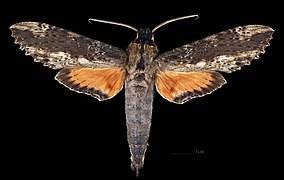
Ceratomia catalpae, the catalpa sphinx, is a hawk moth of the family Sphingidae. The species was first described by Jean Baptiste Boisduval in 1875. Other common names are the Catawba worm, or Catalpa sphinx.

Ceratomia amyntor, the elm sphinx or four-horned sphinx, is a North American moth in the family Sphingidae. The species was first described by Carl Geyer in 1835. It has a wingspan of 3+1⁄4-4+1⁄2 inches. As the name suggests, the larvae (caterpillars) feed on elm trees (Ulmus), but they can also be found feeding on birch (Betula), basswood (Tilia), and cherry (Prunus). When the caterpillars are ready, they crawl to the bottom of the host tree, where they crawl underneath the soil and pupate and may overwinter underground if late enough into the year. Vegetable growers should be aware of this larvae due to its insatiable appetite. One of these larvae are capable in devouring huge amounts of plant's foliage and even succulent stems.
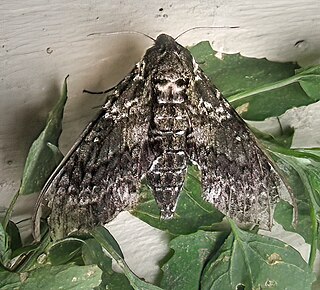
Dolba is a monotypic moth genus in the family Sphingidae erected by Francis Walker in 1856. Its only species, Dolba hyloeus, the pawpaw sphinx, was first described by Dru Drury in 1773.
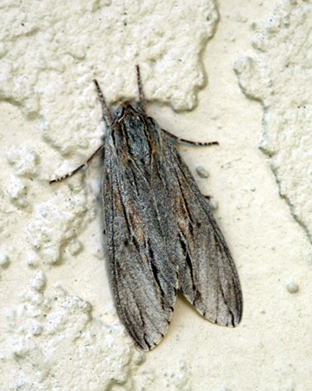
Isoparce cupressi, the baldcypress sphinx or cypress sphinx, is a moth of the family Sphingidae.

Sphinx chersis, the great ash sphinx or northern ash sphinx, is a moth that belongs to the family Sphingidae.

Lintneria eremitus, the hermit sphinx, is a moth of the family Sphingidae. The species was first described by Jacob Hübner in 1823. It is found in the temperate areas of the eastern United States, north into southern Canada over the Great Plains. It prefers gardens and yards, but is common wherever the nectar and larval host plants are found. This moth is easily confused with the Canadian sphinx but these two moths do not typically co-occur.
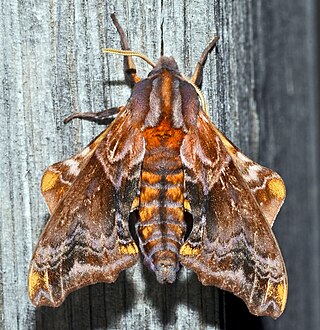
Paonias myops, the small-eyed sphinx, is a moth of the family Sphingidae. The species was first described by James Edward Smith in 1797.

Smerinthus jamaicensis, the twin-spotted sphinx, is a moth of the family Sphingidae. The species was first described by Dru Drury in 1773.
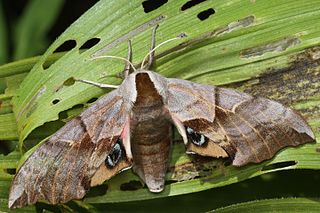
Smerinthus saliceti, the Salicet sphinx, is a moth of the family Sphingidae. The species was first described by Jean Baptiste Boisduval in 1875.
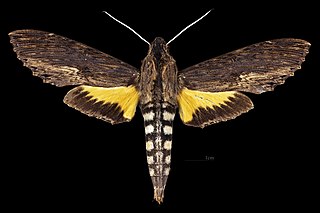
Erinnyis alope, the Alope sphinx, is a moth of the family Sphingidae. It lives from the northern part of South America, through Central America, up to Northern Mexico and the very south of the United States, although strays have been recorded as far north as Arkansas and Kansas.
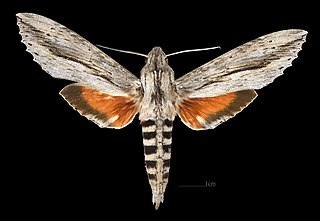
Erinnyis ello, the ello sphinx, is a moth of the family Sphingidae. The species was first described by Carl Linnaeus in his 1758 10th edition of Systema Naturae. It is distributed from Argentina through Central America to the United States as far north as Nevada.

Erinnyis lassauxii, or Lassaux's sphinx, is a moth of the family Sphingidae.
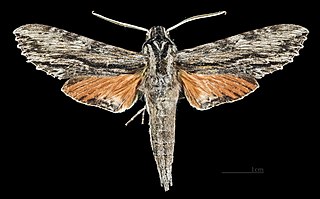
Erinnyis obscura, the obscure sphinx, is a moth of the family Sphingidae. The species was first described by Johann Christian Fabricius in 1775.
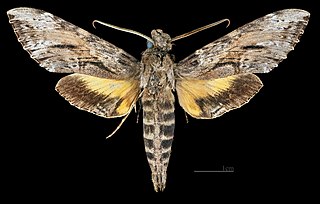
Isognathus rimosa, the rimosus sphinx, is a moth of the family Sphingidae. The species was first described by Augustus Radcliffe Grote in 1865.
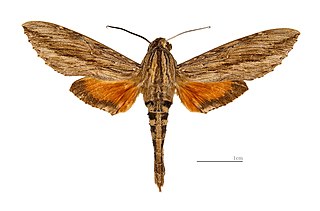
Erinnyis is a genus of moths in the family Sphingidae first described by Jacob Hübner in 1819.

Aellopos ceculus is a moth of the family Sphingidae.
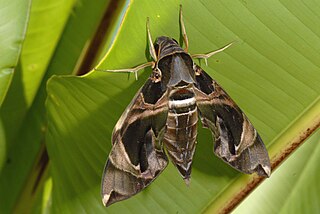
Daphnis hypothous, the jade hawkmoth, is a moth of the family Sphingidae described by Pieter Cramer in 1780. It is known from Sri Lanka, southern and northern India, Nepal, Myanmar, southern China, Taiwan, Thailand, Malaysia, and Indonesia. It is a rare vagrant to the Western Palaearctic realm. During the last hundred years a number have been discovered within the Middle East and one was even found in Scotland late in the 20th century but this was probably imported as a pupa with cargo.

Manduca diffissa is a moth of the family Sphingidae first described by Arthur Gardiner Butler in 1871. It is known from most of South America.
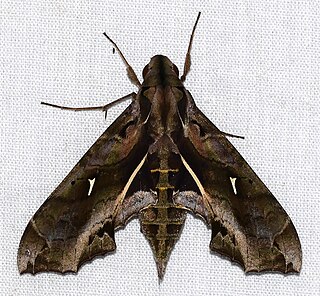
Hemeroplanes ornatus is a species of sphinx moth native from Mexico through northern South America. The species was first described by Walter Rothschild in 1894.

Erinnyis oenotrus, the Oenotrus sphinx, is a moth of the family Sphingidae.

